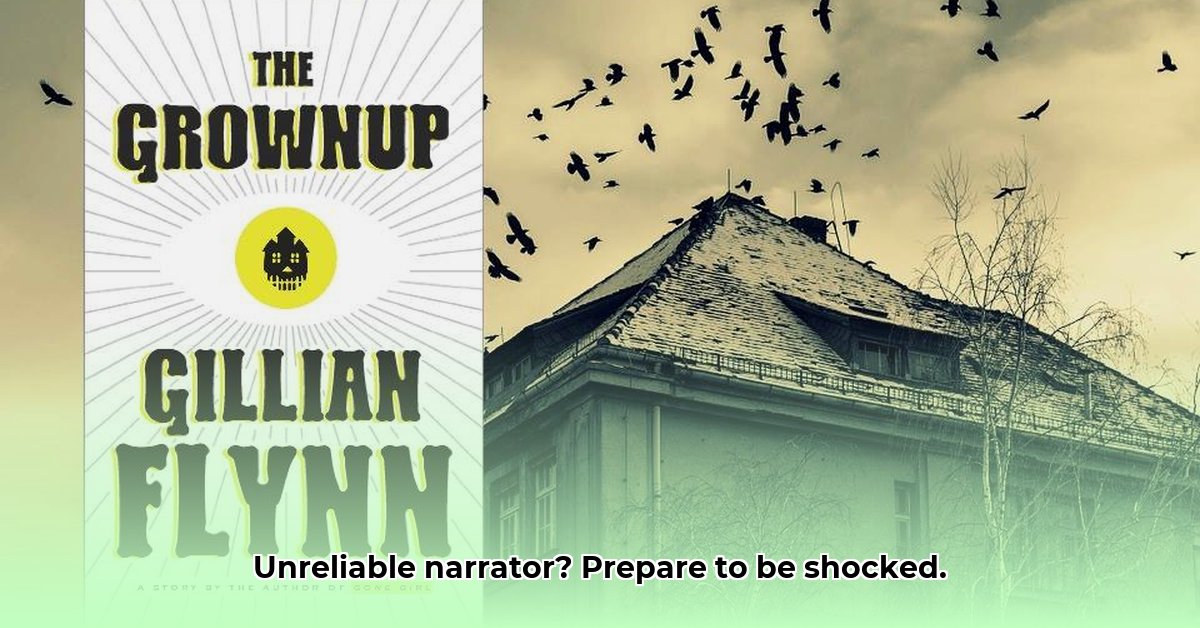Gillian Flynn’s The Grownup isn’t your typical ghost story. It’s a chilling psychological thriller masquerading as a haunted house tale, a masterclass in manipulation where the true horror resides not in supernatural specters, but in the chilling depths of human deceit. Flynn crafts a narrative tightrope, leaving the reader suspended in a state of perpetual unease, questioning every word, every glance, and ultimately, the very nature of truth itself. This isn’t just a story to be read; it’s a psychological game to be played, leaving an unsettling resonance long after the final page is turned.
A House of Cards: Unreliable Narration and the Shifting Sands of Reality
At the heart of The Grownup lies a con artist posing as a psychic, drawn into the orbit of a wealthy housewife desperate to understand her stepson’s disturbing behavior. This seemingly straightforward premise is the first layer of Flynn’s intricate web of deception. The narrative unfolds through the lens of our unnamed protagonist, a master manipulator whose every word is suspect. Is she a victim caught in a web of circumstance, a perpetrator weaving a sinister plot, or perhaps, a chilling blend of both? Flynn masterfully employs unreliable narration, forcing the reader to constantly re-evaluate the unfolding events, creating a pervasive sense of paranoia and suspense. The story’s brisk pacing, like a tightening noose, amplifies this psychological tension, leaving little room to breathe, to question, until the final, devastating twist.
This unreliable narrative isn’t merely a stylistic choice; it’s the very engine of the story. It mirrors the protagonist’s own fractured reality, a world built on lies and half-truths. The reader, much like the characters within the story, is trapped in a psychological game of cat and mouse, constantly trying to decipher the truth from the carefully constructed facade. This ambiguity, far from being a weakness, becomes the story’s greatest strength, transforming the reader into an active participant in the unsettling drama.
Beyond the Facade: The Victorian House as a Mirror of the Psyche
The Victorian setting of The Grownup isn’t mere backdrop; it’s a character in itself, a decaying symbol of repressed desires and hidden secrets. The crumbling mansion mirrors the protagonist’s own fragmented psyche, a physical manifestation of the internal anxieties and societal constraints that bind her. The dark corridors, the creaking floorboards, the oppressive atmosphere – these details amplify the story’s unsettling tone, blurring the lines between reality and delusion. Just as the house hides its secrets behind a veneer of respectability, so too does the protagonist conceal her true nature beneath a carefully crafted mask.
The Victorian era, with its rigid social structures and unspoken anxieties, serves as a powerful metaphor for the protagonist’s internal struggles. The house, a product of this era, becomes a symbolic prison, trapping its inhabitants in a cycle of deception and manipulation. This interplay between setting and character adds a layer of depth to the narrative, transforming the haunted house trope into a potent exploration of psychological confinement.
The Art of the Twist: Subverting Expectations and Embracing Ambiguity
Flynn expertly subverts classic Gothic tropes, using the familiar haunted house setting not as a source of supernatural horror, but as a breeding ground for psychological manipulation. The true ghosts of The Grownup aren’t spectral entities, but the lingering shadows of past traumas and the chilling potential for human cruelty. The narrative’s power lies in its ability to turn the ordinary into the extraordinary, the familiar into the unsettling. A seemingly innocent game of hide-and-seek becomes a chilling exercise in psychological control, a whispered conversation a veiled threat.
The story’s ambiguous ending, far from being a flaw, is a testament to Flynn’s mastery of suspense. It’s a final, disquieting chord that refuses to resolve, leaving the reader grappling with unanswered questions. Did the protagonist escape the web of deceit she so expertly spun? Or is she destined to remain trapped in a cycle of manipulation, forever haunted by the consequences of her actions? This lack of closure isn’t a cop-out; it’s an invitation to delve deeper into the story’s unsettling themes, to confront the uncomfortable truths it reveals about human nature.
The Grownup is not a comfortable read. It’s a sharp, unsettling descent into the darkest corners of the human psyche, a story that will stay with you long after you’ve turned the final page. While its brevity might leave some wanting more, the intensity of the experience, the sheer chilling brilliance of Flynn’s narrative craft, is undeniable. This is a story for those who crave psychological thrillers that challenge perceptions, subvert expectations, and refuse to offer easy answers. Be warned: once you enter the twisted world of The Grownup, you’ll never look at a haunted house—or a seemingly innocent narrator—the same way again.
- Discover Long Black Pepper: Flavor & Health Benefits - April 25, 2025
- Shocking Twists: The Grownup Review: Unreliable Narration - April 25, 2025
- A Quiet Place Book vs Movie: A Deep Dive - April 25, 2025
















